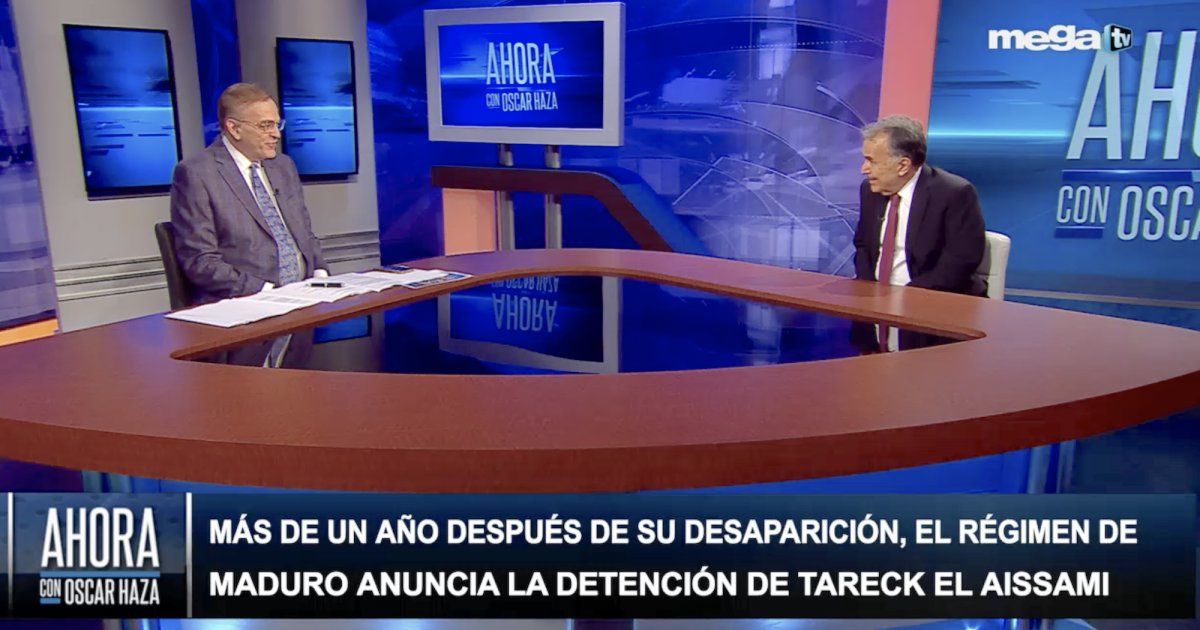MIAMI.- Venezuelan lawyer Omar Estacio referred to the arrest of the former oil minister and president of Petróleos de Venezuela (PDVSA), Tareck El Aissami, wondering “how is it possible that more than 21 billion dollars can disappear without a dictatorship finding out?” “.
“Where is the money from oil sales? How does a group of officials steal such a huge amount of money without being discovered? 27 billion in oil were sold and only 4 billion had entered PDVSA,” he questioned during an interview with journalist Óscar Haza on Mega TV, which provided the video of the program to DIARIO LAS AMERICAS.
Estacio also warned that in a tyranny like that of Nicolás Maduro, the Castro one in Cuba and that of Daniel Ortega in Nicaragua, “the only law there is is that there is no law.”
Therefore, he expressed that analyzing this matter from a legal point of view, in which in his opinion opacity prevails, “is to be naive,” because in Venezuela there is no true justice system.
After being missing for more than a year, the Attorney General's Office of Venezuela announced the arrest of El Aissami, after making progress in the PDVSA-Cripto corruption plot, which began in March 2023, when various state officials and Venezuelan businessmen involved were arrested. in this network of corruption in the oil industry.
Along with the former Venezuelan vice president, the former Minister of Economy and Finance Simón Zerpa was detained, as well as the businessman Samark López, who, like El Aissami, is wanted by the US authorities.
The three officials were presented before the Second Court of Control against Terrorism and charged with the crimes of “treason to the country, appropriation or distraction of public assets, boasting or valuing, money laundering and association to commit a crime.”
Attorney General Tarek William Saab detailed that El Aissami, Samark and Zerpa were involved in the execution of illegal operations that included the assignment of oil cargoes to other entities such as the Superintendency of Crypto Assets (Sunacrip) and the Venezuelan Corporation of Guayana (CVG). ), under the control of the former oil minister.
Corruption plot that lawyer Omar Estacio described as “a true international criminal organization”, in which approximately 80 people linked to El Aissami operated who acted as front men, many of whom are currently detained.
At the same time, he asked himself: “How is it that if El Aissami had been detained for 14 months, he is presented to the Venezuelan authorities at this moment, when the law says that every arrested person must be presented to justice within 48 hours.”
What happened to the Anti-Blockade Law?
He recalled that in 2020 an Anti-Blockade Law promoted by the official National Constituent Assembly (ANC) convened by Nicolás Maduro was approved in an unconstitutional manner, “which resulted in PDVSA being able to sell the oil, and instead of receiving payment in bank accounts. the state oil company, was paid in cryptocurrency in the name of different legal entities.”
“With this law, all financial controls on Venezuelan oil are neutralized and sterilized. It is absurd that in this type of negotiations, PDVSA is the selling company and whoever receives the price of the sales is an absolutely strange company,” he emphasized. .
“It is one thing that there are no accounting traces when the payment that was made to PDVSA through cryptocurrencies is made, and another is that, after a prolonged fiscal period, the company does not have money,” Estacio continued.
Appearance of legitimacy
The Venezuelan jurist asserted that with these arrests Maduro intends to seek appearance in the face of the presidential elections on July 28, which have been involved in a scenario of arrests, disqualifications and persecution of the Venezuelan opposition by the Chavista regime.
“In addition, it may be trying to dress up with an appearance of legitimacy to seek the endorsement of some foundations and international observers,” he added.
Until recently, El Aissami was considered Nicolás Maduro's right-hand man in decision-making within the Chavista leadership along with Cilia Flores, Delcy and Jorge Rodríguez, Diosdado Cabello and Vladimir Padrino López.
He served as vice president of the South American country, before being appointed Minister of Petroleum and sectoral vice president of economy in April 2020, a position from which he resigned last year after the fraudulent operations within PDVSA were revealed in which several of his associates were involved.
In addition, the 49-year-old official was a trusted man of the late ruler Hugo Chávez, and held the portfolio of the Venezuelan Ministry of Interior Relations during his mandate between 2008 and 2012.
@Lydr05

